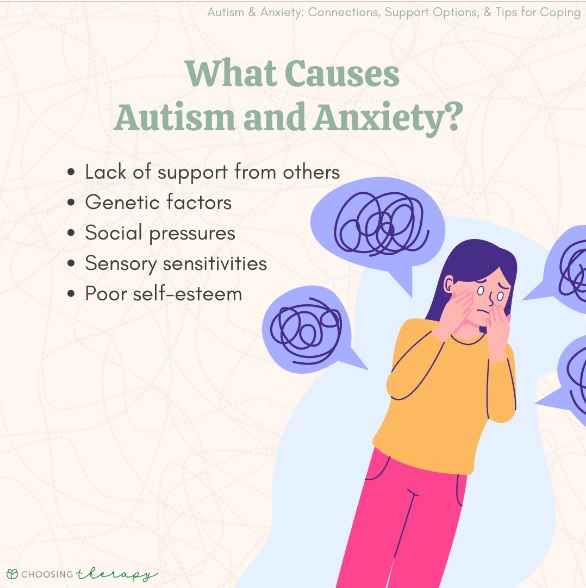Autism Coping Skills: Easing Anxiety and Stress in Children with Autism Spectrum Disorder
22nd July 2024

Discovering effective coping mechanisms for children with autism is essential for parents, special needs educators, and caregivers to improve the well-being of children with Autism Spectrum Disorder (ASD).
Navigating through the challenges that come with ASD, including anxiety and stress, requires a compassionate understanding and effective stress management techniques for autism specifically designed to support your special autistic children.
The significance of such coping mechanisms is such, that they not only aim to improve the daily experiences of children with ASD but also their long-term developmental outcomes. Those parents, special needs educators, and caregivers who have pursued courses like Online Special Education Courses in Malaysia, know this fact really well.
However, if you want to know more about coping mechanisms for children with autism and how you can help them to deal with their anxiety and stress, then we have got you covered.
This blog post will guide you on how to recognize the signs of anxiety and stress in your children with autism and some of the best practical strategies for helping your children with Autism Spectrum Disorder (ASD) to alleviate their stress and anxiety.
Before you move to the topic, can we ask you a quick question? Do you follow us on Social Media? If not, then you’re missing out on a lot of informative content. We regularly share upgraded educational content, tips, feedback, and more. Check us out by clicking the profiles here - Facebook / Twitter / LinkedIn / Pinterest / Instagram / YouTube
Signs of Anxiety and Stress in Children With Autism Spectrum Disorder (ASD)
Here are some of the signs of anxiety and stress in your children with Autism Spectrum Disorder (ASD):
Behavioural Indications

Source: choosingtherapy.com
When your child with autism experiences anxiety, you might notice an increase in self-regulation behaviours or a regression to previous behaviours. These can manifest as meltdowns, emotional flare-ups, or withdrawal from social situations. Children might also exhibit repetitive behaviours with no apparent function, such as shredding paper or clothing.
Additionally, behaviours like insistence on routines, reliance on obsessions, or even selective mutism can indicate that your child is feeling overwhelmed and anxious. Common triggers include changes in routine, unfamiliar environments, or sensory overloads.
Physical Symptoms
Anxiety in children with ASD can also present physical symptoms that are sometimes the only clues to their distress. These symptoms can include
- Sweating
- Trembling
- Restlessness
- Upset stomach, etc.
More severe signs might include a rapid heartbeat, headaches, or changes in appetite. Notice if your child shows signs of muscular tension, such as a clenched jaw or tight shoulders, which can accompany feelings of nervousness.
Difficulty sleeping, either falling or staying asleep, is another significant indicator of anxiety. These physical responses are crucial for recognizing when your child might be experiencing heightened anxiety or stress.
Practical Strategies to Address Stress & Anxiety in Children With Autism Spectrum Disorder (ASD)
Here are some of the effective anxiety & stress management techniques for autism:
Creating a Sensory-Friendly Environment
To alleviate anxiety and stress in children with autism, start by creating a sensory-friendly environment. This includes minimizing overwhelming stimuli like harsh lighting and loud noises. You can enhance comfort by using dimmed lights or providing noise-cancelling headphones.
Additionally, ensure the space is free from strong scents and visual clutter, and consider the use of sensory-friendly toys and weighted blankets to provide a sense of security.
Implementing Predictable Routines
Establishing predictable routines is crucial for children with autism. Consistent daily activities help them understand what to expect, reducing anxiety. Use visual schedules and clear, consistent patterns in daily activities, from waking up to bedtime routines. This predictability helps children navigate their day with less stress and more confidence.
Calming Techniques
Various calming techniques can be employed to manage anxiety. Deep breathing exercises, progressive muscle relaxation, and mindfulness meditation are effective strategies. These practices help children slow down their body's response to stress, focusing on the present moment and regulating their emotions. Incorporating activities like yoga and music therapy can also promote relaxation and emotional well-being.
Encouraging Safe-Stimming
Stimming, or self-stimulatory behaviour, is a common way for children with autism to manage sensory overload and anxiety. Encourage safe stimming by offering appropriate outlets such as fidget toys or chewable jewellery. Understanding and integrating these behaviours positively can reduce anxiety and enhance focus, making them a part of the child’s daily routine to help them feel more secure and engaged.
Reduce The Stress & Anxiety Level of Your Autistic Children With These Strategies
Dealing with and providing support to children with autism has its own challenges because due to sensory overload and other emotional-behavioural reasons, they might feel high levels of anxiety and stress. However, with the above-mentioned effective strategies to address stress and anxiety, you can provide the necessary guidance and support to help your children with autism thrive in every aspect of life.
If you want to learn more effective ways to support and provide necessary guidance to your children with Autism Spectrum Disorder (ASD). Then, consider pursuing courses like Online Special Education Courses in Malaysia, where you will get to learn from top experts from the education industry.
We believe education should be accessible for everyone. That’s why we don’t charge for our blogs. Find the right course that will help you in your career with us, contact us at - +6531631068. You can mail us at act@asiancollegeofteachers.com.






